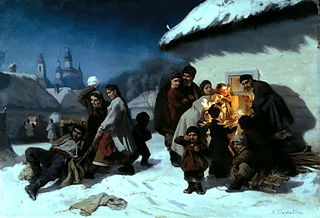This article has multiple issues. Please help improve it or discuss these issues on the talk page . (Learn how and when to remove these template messages) (Learn how and when to remove this template message)
|
It has been suggested that this article be merged into Slavic calendar . (Discuss) Proposed since October 2017. |
The Croatian months used with the Gregorian calendar by Croats differ from the original Latin month names:
The Gregorian calendar is the calendar used in most of the world. It is named after Pope Gregory XIII, who introduced it in October 1582. The calendar spaces leap years to make the average year 365.2425 days long, approximating the 365.2422-day tropical year that is determined by the Earth's revolution around the Sun. The rule for leap years is:
Every year that is exactly divisible by four is a leap year, except for years that are exactly divisible by 100, but these centurial years are leap years if they are exactly divisible by 400. For example, the years 1700, 1800, and 1900 are not leap years, but the year 2000 is.

Croats or Croatians are a nation and South Slavic ethnic group native to Croatia. Croats mainly live in Croatia and Bosnia and Herzegovina, but are also recognized minorities in such countries as Austria, the Czech Republic, Germany, Hungary, Italy, Montenegro, Romania, Serbia, Slovakia, and Slovenia.
Contents
| No. | Latin name | English name | Croatian name | Croatian meaning |
|---|---|---|---|---|
| 1 | Ianuarius | January | Siječanj | month of cutting or hewing (wood), but there are also dialectal terms 'svečan, svičen, sičan' that have a meaning 'festive', so there is a possibility of a meaning 'festive month' (as there are several holidays celebrated in January) [1] |
| 2 | Februarius | February | Veljača | month in which days become longer (oveljiti se = to get bigger); [2] also, possibly from "Velja Noć" (Great Night), old Slavic pagan festival that falls in modern-day February |
| 3 | Martius | March | Ožujak | lying month (laž>ož; laž = a lie), because the weather is changing often |
| 4 | Aprilis | April | Travanj | month of grass growing [ permanent dead link ] |
| 5 | Maius | May | Svibanj | month of budding (svibovina = Cornel tree) |
| 6 | Iunius | June | Lipanj | month of the lipa [ permanent dead link ] (lime / linden tree) |
| 7 | Iulius | July | Srpanj | month of reaping (with a sickle) [ permanent dead link ] |
| 8 | Augustus | August | Kolovoz | month of driving the wagon (for harvest) — kolo + voziti |
| 9 | September | September | Rujan | month of animal mating (from archaic verb for animal roar "rjuti", referencing mating calls) |
| 10 | October | October | Listopad | month of falling leaves — list + padati |
| 11 | November | November | Studeni | cold month |
| 12 | December | December | Prosinac | the beginning of the Sun's shining (sinuti = to dawn); [3] probably used for January at first, as it's still often used for that month in other Slavic languages. Also, less probably month of begging (for food, f.e.), from prositi = to beg. |
Some names are derived from archaic Croatian-Slavic words that are no longer found in standard Croatian dictionaries. In some cases even the meaning of those words is ambiguous.
In Macedonian, Listopad is also the (archaic) name for October but Polish/Czech listopad, Belarusian 'listapad' ('Лістапад') and Ukrainian "листопад" mean November. Likewise, Polish sierpień, Czech srpen and Ukrainian Серпень mean August rather than July, Czech říjen means October rather than September, Slovenian prosinec means January rather than December, and Polish lipiec, Belarusian Лiпень, and Ukrainian Липень mean July rather than June.







